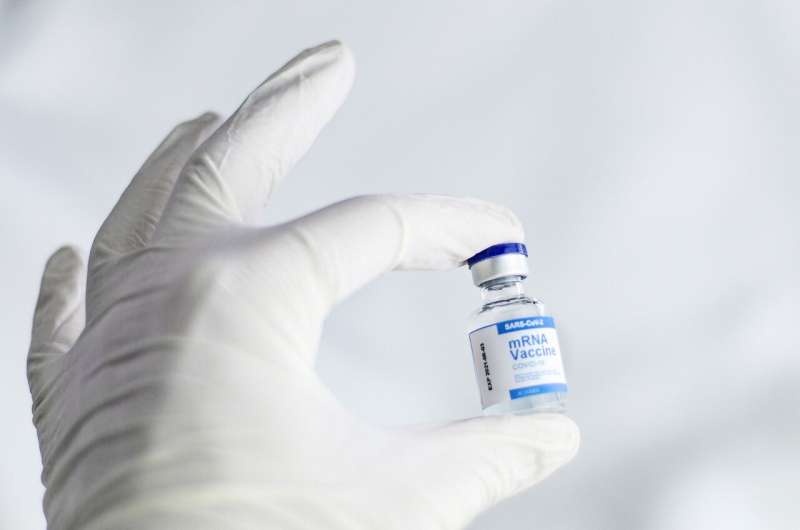
Antibody response in people aged over 80 is three-and-a-half times greater in those who have the second dose of the Pfizer COVID-19 vaccine after 12 weeks compared to those who have it at a three-week interval, finds a new study led by the University of Birmingham in collaboration with Public Health England.
The study, supported by the UK Coronavirus Immunology Consortium, of 175 people who were aged over 80 and living independently is the first direct comparison of the immune response in any age group between those who are given the second Pfizer vaccine at a three-week interval and those at a 12-week interval. The Pfizer vaccine was originally authorized for a three-week interval between doses; however several countries, including the UK, chose to expand this to a 12-week interval to allow a higher percentage of the population to receive one vaccine dose quicker.
The research found that extending the second dose interval to 12 weeks increased the peak SARS-CoV-2 spike specific antibody response 3.5-fold compared to those who had the second vaccine at three weeks. Although the peak cellular immune responses were lower after the delayed second vaccine, responses were comparable between the groups when measured at a similar time point following the first dose.
The team concluded that extending administration of the second Pfizer vaccine to 12 weeks potentially enhances and extends antibody immunity, which is believed to be important in virus neutralization and prevention of infection.
The research, which has been published as a preprint and therefore not yet peer reviewed, was jointly funded by UK Research and Innovation (UKRI) and the National Institute for Health Research (NIHR) and supported by the British Society for Immunology.
First author Dr. Helen Parry, NIHR Academic Clinical Lecturer at the University of Birmingham, said: “SARS-CoV-2 vaccines have been remarkably effective in providing large-scale protection against infection and symptomatic disease—but many questions remain regarding their optimal delivery for provision of effective and sustained immunity.
“This is the first time antibody and cellular responses have been studied when the second vaccine is given after an extended interval. Our study demonstrates that peak antibody responses after the second Pfizer vaccine are markedly enhanced in older people when this is delayed to 12 weeks.
“This research is crucial, particularly in older people, as immune responses to vaccination deteriorate with age. Understanding how to optimize COVID-19 vaccine schedules and maximize immune responses within this age group is vitally important.”
Corresponding author Paul Moss, Professor of Hematology at the University of Birmingham and Principal Investigator of the UK Coronavirus Immunology Consortium, added: ” The enhanced antibody responses seen after an extended interval may help to sustain immunity against COVID-19 over the longer term and further improve the clinical efficacy of this powerful vaccine platform.
“Our research findings may be important in the development of global vaccination strategy as extension of interval of the second vaccine dose in older people may potentially reduce the need for subsequent booster vaccines.”
The research saw the team taking blood samples for analysis in the lab after participants’ first vaccine and then again two to three weeks after participants had received their second vaccine. Of the cohort, 99 participants had the second vaccine at three weeks, while 73 had the second dose at 12 weeks.
Participants who had previous infection (10 in the three-week interval group and five in the 12-week interval group) were excluded from the analysis as previous infection has been shown to have a major impact on the immune response to vaccination.
After their second vaccine, spike-specific antibodies were detected in all participants no matter how far apart their doses were. However, after the second vaccine the average concentration of antibodies was 3.5 times higher in the 12-week interval group (4,030 U/ml) compared to the three-week interval group (1,138 U/ml).
In relation to the cellular (or T cell) immune response, which plays an important role in supporting and maintaining antibody production, the team found that within the three-week interval group, 60% had a confirmed cellular response at two to three weeks following the second vaccine—although this fell to only 15% eight to nine weeks later.
The proportion of participants showing a cellular response in the 12-week-interval group was only eight percent at five to six weeks after the first vaccine, but this rose to 31% two to three weeks after the second vaccine. Research is required to further explore these variations in responses.
Dr. Gayatri Amirthalingam, Consultant Epidemiologist at PHE, said: “The higher antibody responses in people receiving two doses of the Pfizer vaccine using an extended 12 week interval provides further supportive evidence of the benefits of the UK approach to prioritize the first dose of vaccine. This analysis shows better antibody responses in those receiving their second dose at 12 weeks compared to the standard three-week schedule.
“It is vital that you take up the offer of vaccination as it is the best way to protect yourself and your community and to help us out of the pandemic.”
Source: Read Full Article
